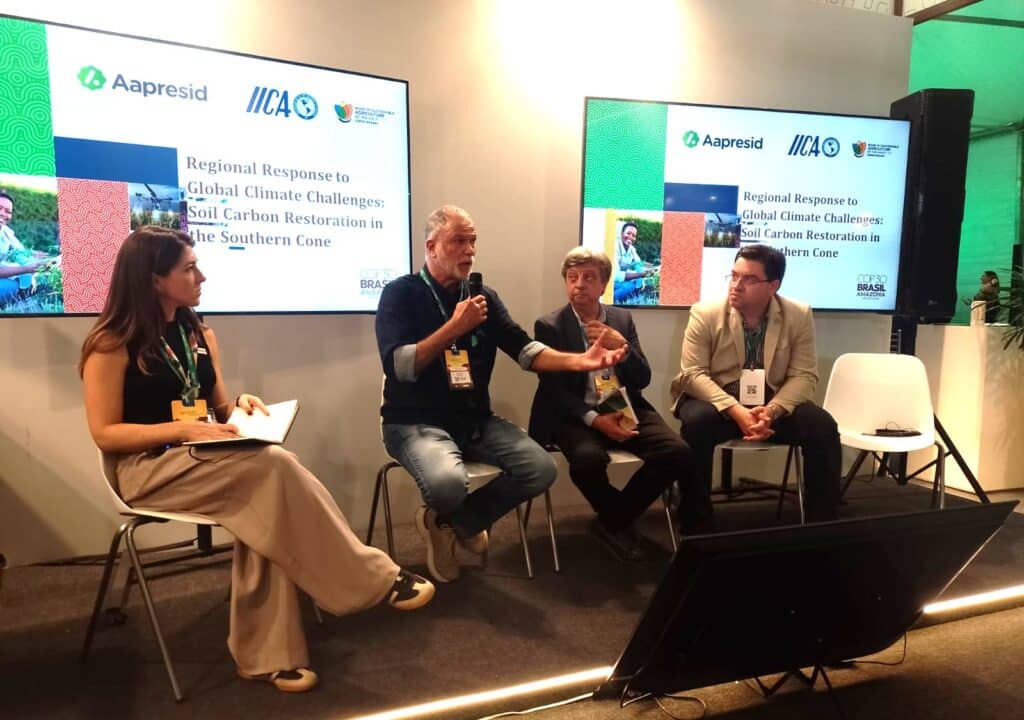
Belém do Pará, Brazil, 18 November 2025 (IICA) – Representatives of producer associations attending COP30 maintain that an agriculture sector that preserves the environment and addresses consumer demands will also be more productive and profitable. The conference, which is taking place in the Brazilian Amazon, has convened more than 50,000 delegates from almost 200 countries.
The pavilion established by the Inter-American Institute for Cooperation on Agriculture (IICA) and its partners at the world’s largest environmental discussion forum hosted a dialogue on the need to produce more food amidst the reality of natural resource degradation.
Producer associations showcased the solutions that are already being implemented in the countries of Latin America’s Southern Cone, which simultaneously address productive and environmental concerns, while producing concrete results that boost farmers’ income and better meet growing consumer demands.
As such, the discussion focused on the need to assist farmers to generate ecosystem services, by providing them with new technology, financing and adequate regulatory frameworks.
The event was organized by the Argentine Association of Direct Seeding Producers (AAPRESID) and the Confederation of American Associations for Sustainable Agriculture (CAAPAS), in partnership with IICA.
The speakers’ presentations focused on the potential of the Southern Cone countries to restore soil carbon, thus providing a regional response to global climate challenges. They also touched on the need to reinforce the region’s position, by providing data and scientific evidence that demonstrate its contribution to resolving environmental challenges.
Roberto Rodrigues, former Minister of Agriculture and Livestock of Brazil and Special Envoy for Agriculture to COP30; and Manuel Otero, Director General of IICA, opened the event.
Rodrigues remarked that, “In Brazil, we have developed a sustainable and competitive tropical agriculture sector. We are playing an increasingly important role in global food security and energy security. We have also proven that we have the capacity to produce more and to generate employment and income, thus contributing to the fight against poverty and assisting to combat climate challenges”.

Roberto Rodrigues, former Minister of Agriculture and Livestock of Brazil; Marcelo Torres, President of AAPRESID; Mailen Saluzzio, Manager of AAPRESID’s International Program; Daniel Trento, Advisor to the Brazilian Agricultural Research Corporation (EMBRAPA); and Manuel Otero, Director General of IICA.
Crisis and lessons
Marcelo Torres, President of AAPRESID, explained that his organization had been founded 36 years ago in central Argentina, when a group of producers realized that the soils were being degraded, but they lacked both the knowledge and the equipment to tackle the problem.
He recalled that, “The crisis taught us many lessons. Argentina is a country of large expanses, from North to South, and it has varying climates and soils. Thus, we had to develop different solutions. We have done so quite successfully, but we recognize that today we are facing a global challenge, given the low profitability of agriculture, increasing consumer demands and young people’s disinterest in agriculture.
Torres stressed that science, farmers and industry must work hand in hand to develop precise indicators to determine agriculture’s impact on aspects such as the carbon footprint, the water footprint or the use of agrochemicals. He said: “We must send the world a message, without arrogance, and that is why we are here. We want to build a conduit that connects producers and consumers, employing reliable indicators, based on science and technology, and in a language that is readily understood”.
Juca Moraes de Sá, Technical Coordinator of the Brazilian Federation of No-Till Farmers (FEBRAPDP), celebrated the fact that the advances made by Latin American and Caribbean agriculture in soil carbon sequestration had been given a prominent place in this year’s COP agenda.
He revealed that no-till farming, a technique that promotes cultivation with minimal disturbance to the soil, was first introduced in Brazil in 1972 on 200 hectares. Today, it accounts for 56 million hectares of cultivated land.
“We have been able to achieve zero or even negative emissions, thus demonstrating that no-till farming is a model that results in healthy soil, builds resilience and ensures greater productivity and profitability. It also preserves the soil for future generations, benefiting the producer, the planet and the consumer. That is our legacy”, he maintained.
Daniel Trento, Advisor to the Brazilian Agricultural Research Corporation (EMBRAPA), explained that that state institution had decided to create the AgriZone at COP30 to ensure a place for the agriculture sector in the discussions on climate challenges.
He pointed out that, “People often forget that COP is multisectoral and that agriculture is the sector most vulnerable to climate change, given the impact of droughts and flooding. Agriculture only began to feature in discussions at COP26 in 2021 in Glasgow. Yet, today, in Belem do Pará, the sector is the protagonist. EMBRAPA and its partners, like IICA, are demonstrating that agriculture can restore degraded soils and produce more, without encroaching in the least on forests”.
Trento underscored the issue of financing and economic feasibility: “Producers in the Southern Cone are pragmatic. We must ensure that agricultural technologies reduce costs, so that producers will adopt them”.

Roberto Rodrigues, former Minister of Agriculture and Livestock of Brazil; and Manuel Otero, Director General of IICA.
More information:
Institutional Communication Division.
comunicacion.institucional@iica.int











